News
Sexual exploitation: 24 Nigerian girls rescued in Senegal
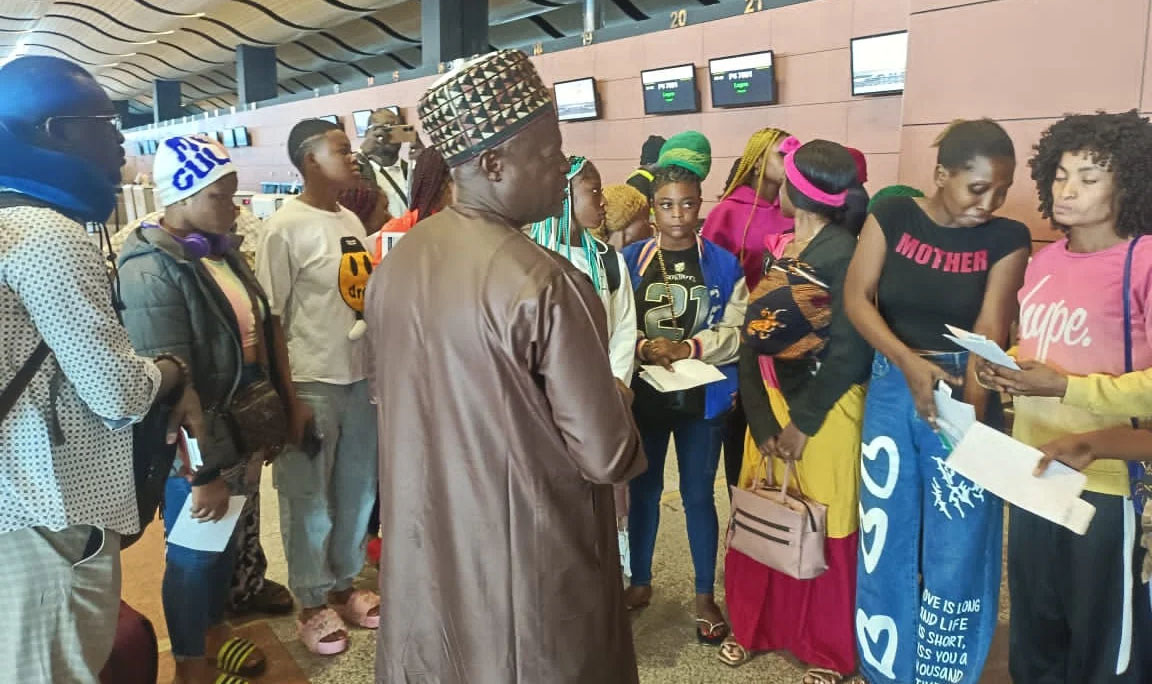
Sexual exploitation: 24 Nigerian girls rescued in Senegal
Combined operatives of the Nigerian Embassy and a Senegalese-based NGO have in an overnight operation rescued 24 Nigerian girls who were subjected to sexual exploitation in Tamaccounda and Kedougou Regions of Senegal.
Dr Salihu Abubakar, the acting Ambassador of the Nigerian Embassy in Dakar, Senegal disclosed this to the News Agency of Nigeria (NAN) in Dakar on Sunday.
According to him, the girls mostly under-aged, ranging between the ages of 11, 13 and 24 are being trafficked to Senegal, through Cotonou, Republic of Benin, via Mali to Senegal border for the purpose of sexual exploitation in Tamaccounda and Kedougou Regions.
“These girls and many more are being trafficked to Senegal, through Cotonou, Benin Republic via Mali to the Senegal border for prostitution,” the diplomat said.
READ ALSO:
- Ekiti student slits colleague’s throat
- Pastor Agbala Gabriel is an ingrate, says Aunty Ramota in viral video
- PUNCH appoints new deputy editors, speaks on sweeping changes
Abubakar said preliminary investigation revealed that most of the girls, who were school dropouts were from Edo and Delta, adding that a few of them were from Imo and Abia while two others were from Plateau.
He, however, said of the 24, 22 were already repatriated weeks ago while the two other ladies were repatriated to Nigeria on Saturday and had landed in Nigeria safely.
The diplomat could not immediately give the details of the health status of the victims and other information regarding the time they spent while undergoing sexual exploitation in Senegal.
The envoy said that the successful repatriation of the girls to Nigeria was a clear indication of the strengthened international cooperation in combating human trafficking between the embassy and the Senegalese-based NGO, “Free the Slaves” (La Lumiere in French).
“Our main goal and number one priority is to discourage the trafficking of our girls to any part of the world for prostitution under any disguise,” Abubakar said.
Sexual exploitation: 24 Nigerian girls rescued in Senegal
News
Tinubu Urges Senate to Confirm Yusuf for NAHCON, Marafa for INEC

Tinubu Urges Senate to Confirm Yusuf for NAHCON, Marafa for INEC
President Bola Ahmed Tinubu has called on the Nigerian Senate to swiftly confirm the nominations of Ambassador Ismail Abba Yusuf as Chairman of the National Hajj Commission of Nigeria (NAHCON) and Rear Admiral Jemila Abubakar Marafa (retd.) as a National Commissioner of the Independent National Electoral Commission (INEC). The move underscores the administration’s focus on strengthening leadership in key federal institutions ahead of critical national events.
In a letter to Senate President Godswill Akpabio, Tinubu stressed the urgency of filling the leadership gap at NAHCON, following the resignation of the previous chairperson. Ambassador Yusuf, a seasoned diplomat and former Nigerian envoy to Türkiye, brings significant international experience and administrative expertise, making him well-positioned to lead the commission in managing future Hajj operations efficiently.
READ ALSO:
- Galatasaray Stun Juventus 5–2 in UEFA Champions League
- Vinicius Jr’s Wonder Goal Gives Real Madrid Victory Over Benfica
- Trump’s Executive Order Halts US Aid, 250,000 Lives Affected in Yobe
For INEC, the nomination of Rear Admiral Marafa (retd.) is aimed at reinforcing the commission’s leadership ahead of the 2027 general elections. Representing Adamawa State, Marafa’s confirmation would bolster electoral governance, ensuring transparency, credibility, and smooth conduct of national elections.
Both nominations were formally read during Senate plenary and referred to the relevant committees — the Committee on Foreign Affairs for NAHCON and the Committee on Electoral Matters for INEC — with directives for expedited review and reporting within one week.
The President emphasized that having qualified and experienced leadership in statutory bodies like NAHCON and INEC is essential for national stability, and Senate confirmation will enable the nominees to assume office with full legal authority and mandate.
Tinubu Urges Senate to Confirm Yusuf for NAHCON, Marafa for INEC
News
Falana, Jibrin, Bugaje Lead Opposition to US Military Presence in Nigeria
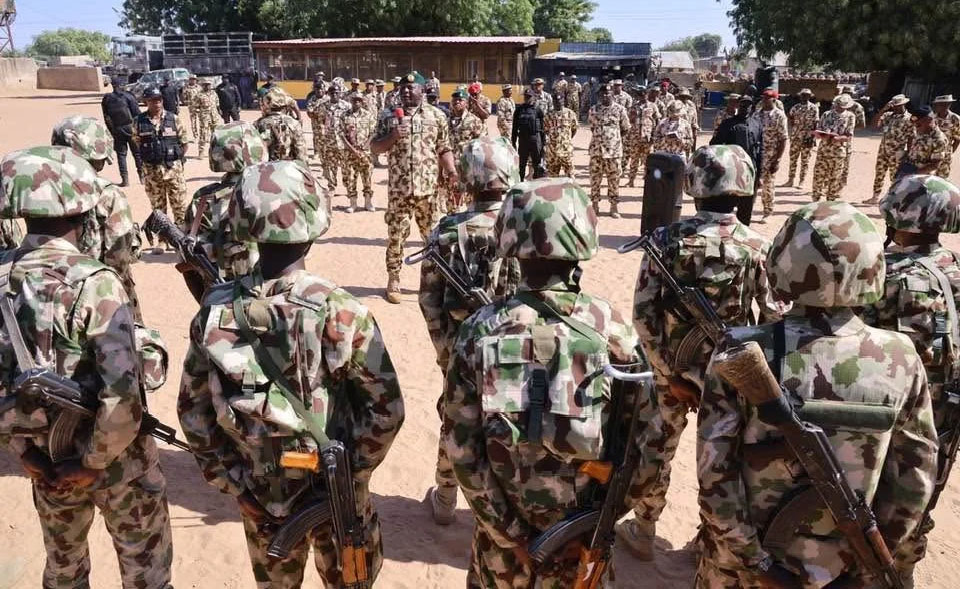
Falana, Jibrin, Bugaje Lead Opposition to US Military Presence in Nigeria
Some prominent Nigerians have condemned the reported US military presence in Nigeria, describing it as a violation of Nigeria’s sovereignty, a potential breach of the 1999 Constitution, and a dangerous precedent for foreign military interference in the country’s security affairs.
The criticism followed the arrival of United States military aircraft in Nigeria last week, shortly after American and Nigerian officials disclosed plans to deploy about 200 US soldiers in advisory and training roles. US officials said the aircraft movements would continue for several weeks as part of a temporary counterterrorism mission.
Nigeria’s Defence Headquarters (DHQ) has insisted that the US personnel are technical specialists, not combat troops, and that they will operate strictly under the authority and control of the Nigerian government, in coordination with the Armed Forces of Nigeria. The military stressed that the deployment does not amount to the establishment of a foreign base or independent US operations on Nigerian soil.
Despite these assurances, a coalition of lawyers, academics and civil society figures issued a joint statement titled “No to Foreign Forces in Our Land: Defend Our Sovereignty”, warning that the presence of foreign troops raises serious constitutional, legal and national security concerns.
The statement was signed by human rights lawyer Femi Falana (SAN), political scientist Jibrin Ibrahim, Dr Abubakar Siddique Mohammed, Dr Dauda Garuba, Prof Massaud Omar, Prof Mohammed Kuna, Engr YZ Ya’u, and political activist Usman Bugaje.
They recalled Nigeria’s long-standing resistance to foreign military domination, warning against what they described as a creeping neo-colonial security arrangement. According to the group, Nigeria’s independence was founded on firm opposition to external military control, a principle they said must not be compromised under any guise.
READ ALSO:
- Insurgents Acquire 35 Drones as ISWAP Shifts to Aerial Attacks
- Seven Killed in Horrific Crash at Ota Toll Gate
- Nigerian Equities Post World’s Second-Best Dollar Returns in 2026, Recover $21bn
The signatories referenced the Anglo-Nigerian Defence Pact of 1960, which was abrogated in 1962 following widespread public protests, arguing that political independence without military sovereignty is incomplete. They also cited Nigeria’s rejection of foreign pressure during the 1976 Organisation of African Unity (OAU) summit on Angola, recalling the historic declaration by Murtala Mohammed that Africa would no longer operate under the influence of extra-continental powers.
The group further highlighted past attempts to impose military cooperation agreements on Nigeria, including a proposed US–Nigeria defence pact in 2001 that was withdrawn after opposition from the Ministry of Defence, and the Bilateral Immunity Agreement (BIA) signed in 2003 and later nullified by the Senate in 2005 for violating constitutional provisions and the Rome Statute.
They cited Section 12(1) of the 1999 Constitution, which requires National Assembly approval before any international treaty can have the force of law in Nigeria, insisting that any foreign military deployment must follow due legislative process.
Rejecting claims that Nigeria lacks the capacity to defend itself, the group pointed to the strong peacekeeping record of the Nigerian Armed Forces under the United Nations, African Union, and ECOMOG missions in Liberia and Sierra Leone. They argued that Nigeria should prioritise modernising its military, strengthening intelligence coordination, improving troop welfare, investing in local defence production, and addressing the root causes of insecurity rather than outsourcing national defence.
In a separate interview, Prof Jibrin Ibrahim warned that Nigerians appear less vigilant today than in the 1960s, when public resistance forced the government to abandon foreign defence pacts. He questioned the effectiveness of US military interventions globally, arguing that such involvement often deepens insecurity rather than resolves it.
Observers say the controversy has reignited debate over how Nigeria should balance international security cooperation with the need to protect national sovereignty, constitutional order, and democratic accountability amid rising security challenges across the country.
Falana, Jibrin, Bugaje Lead Opposition to US Military Presence in Nigeria
News
Ramadan Begins in Nigeria as Sultan Confirms Crescent Sighting
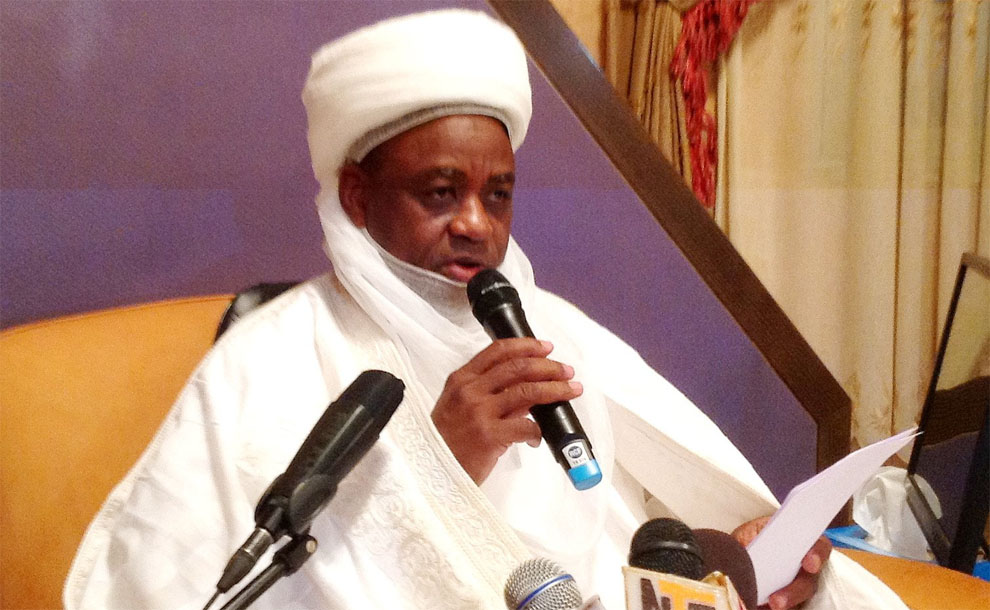
Ramadan Begins in Nigeria as Sultan Confirms Crescent Sighting
Abuja — The Sultanate Council on Tuesday night confirmed the sighting of the crescent moon, officially signaling the commencement of Ramadan 1447AH in Nigeria.
The President-General of the Nigerian Supreme Council for Islamic Affairs (NSCIA) and Sultan of Sokoto, Muhammad Sa’ad Abubakar III, announced that the new moon was sighted in parts of the country, thereby declaring Wednesday, February 18, 2026, as the first day of fasting for Muslims nationwide.
The announcement followed verified reports from moon-sighting committees across several states, in line with Islamic tradition which requires physical sighting of the crescent to mark the beginning of the ninth month of the Islamic lunar calendar.
In his message to the Muslim faithful, the Sultan urged Nigerians to use the holy month to pray for peace, unity, and national development. He also called on Muslims to embody the virtues of patience, compassion, charity, and self-discipline which Ramadan represents.
READ ALSO:
- Deadlock at National Assembly as House Snubs Electoral Act Bill Meeting on E-Transmission Clause
- Maikori Accuses Ex‑Governor El‑Rufai of Persecution Over 2017 Tweet
- Shari’ah Council Defends Kwankwaso, Rejects US “Christian Genocide” Claims
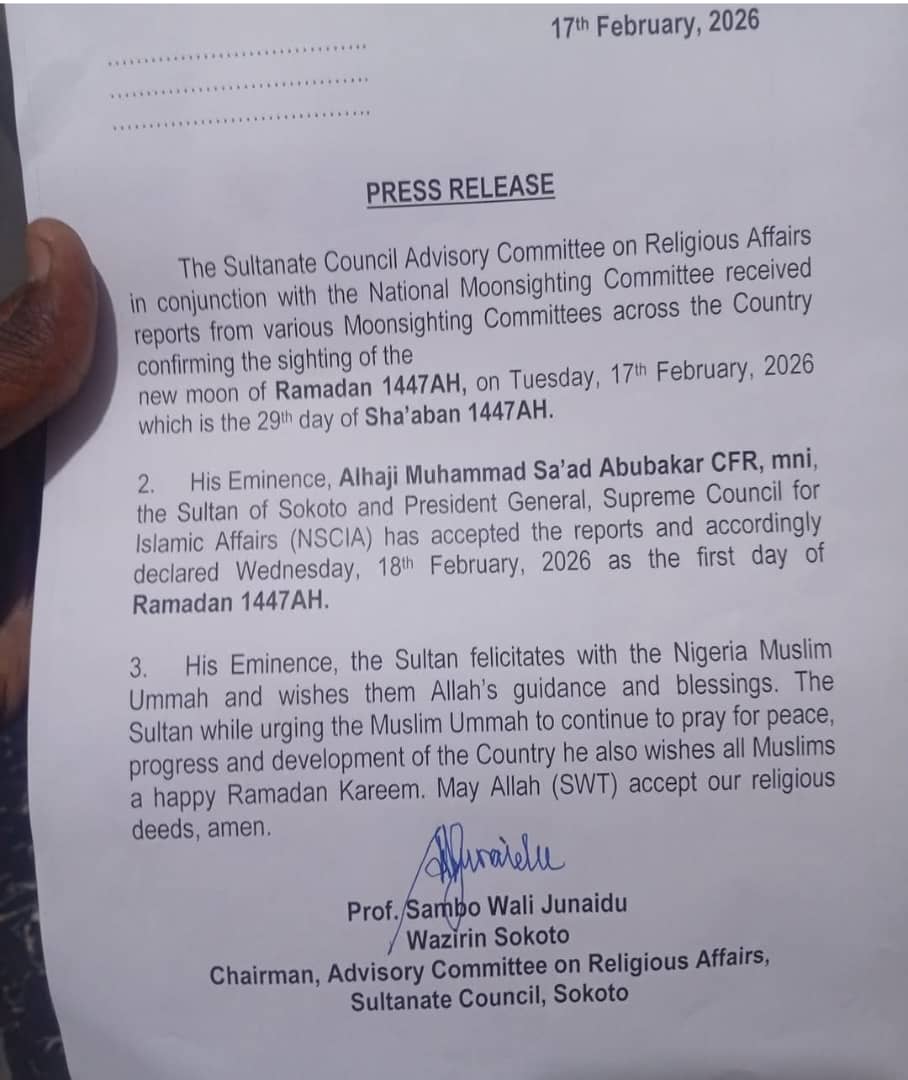 Ramadan, one of the five pillars of Islam, requires adult Muslims to abstain from food, drink, and other physical needs from dawn until sunset throughout the month. The period is also marked by increased devotion, nightly congregational prayers in mosques, recitation of the Qur’an, and acts of charity to the less privileged.
Ramadan, one of the five pillars of Islam, requires adult Muslims to abstain from food, drink, and other physical needs from dawn until sunset throughout the month. The period is also marked by increased devotion, nightly congregational prayers in mosques, recitation of the Qur’an, and acts of charity to the less privileged.
Across major cities including Abuja, Lagos, Kano, and Port Harcourt, mosques recorded increased attendance for special night prayers following the announcement. Markets also witnessed heightened activity as families made last-minute purchases in preparation for the fasting period.
Ramadan will last 29 or 30 days, depending on the sighting of the next crescent, and will culminate in the celebration of Eid al-Fitr, marking the end of the fasting month.
Muslim leaders have encouraged faithful to observe the fast in accordance with Islamic teachings while maintaining harmony and mutual respect within Nigeria’s diverse society.
Ramadan Begins in Nigeria as Sultan Confirms Crescent Sighting
-

 News3 days ago
News3 days agoOsogbo Sons and Daughters Mark 5th Anniversary with Awards, Political Undertones
-

 News23 hours ago
News23 hours agoSaudi Arabia Confirms Sighting of Ramadan Crescent, Fasting Begins Wednesday
-

 metro2 days ago
metro2 days agoUS Freezes Assets of Eight Nigerians Over Boko Haram, ISIL, Cybercrime Links
-

 News19 hours ago
News19 hours agoRamadan Begins in Nigeria as Sultan Confirms Crescent Sighting
-

 metro20 hours ago
metro20 hours agoLagos Woman Shares Ordeal After Alleged Rape, Sparks Nationwide Outcry
-

 Entertainment2 days ago
Entertainment2 days agoMystery in Lekki: Police Probe Death of Two Nollywood Crew Found Lifeless in Parked Car
-

 metro2 days ago
metro2 days agoTerror in Lagos Traffic: Cutlass Gang Unleashes Mayhem on Mile 12–Ketu Road
-
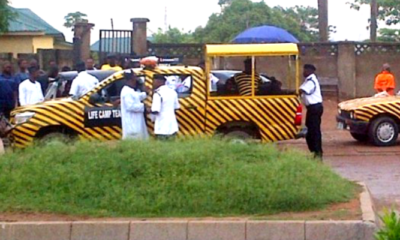
 Auto2 days ago
Auto2 days agoAppeal Court Ruling on VIO Limited to Abuja, Not Lagos — LASG















